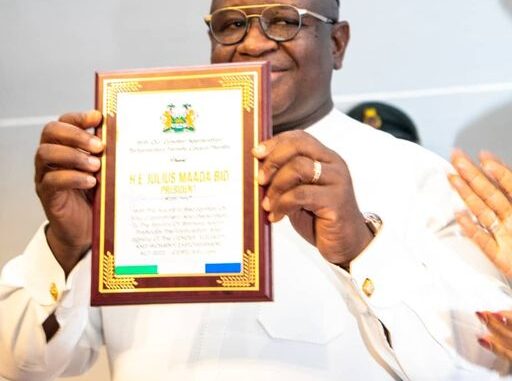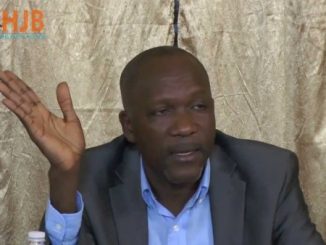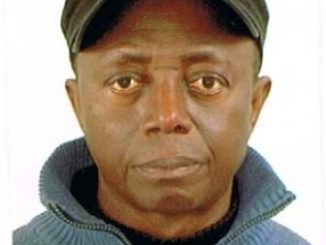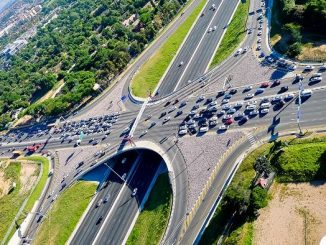
Looking Back At Maada Bio’s 5 Years In Power.
By Karim Bah
Below I am reposting what I wrote 5 years ago. May 7th 2018. Maada Bio was only One Month in office and his first major policy was the re-introduction of the populist NPRC -junta National Cleaning Days. It was cataclysmic failure and set the stage for more and more failures throughout his reign. They say coming events cast their, often dark, shadows.
In a Facebook post to this write up, I criticized this policy. For that I was attacked by many SLPPers including then diehard Maada Bio supporter Dr. Edriss Lahai. Prior to that he had been my good social media friend under the APC rule. Once in power, they were not willing to listen to any other suggestions. I immediately became an APC apologist, in the jaundiced and green-tainted eyes of the Paopanistas . I am sure APC will soon revert to that if they come back to power after the June 2023 elections.
I am happy that this obnoxious national cleaning day aka National Killing Day, event was abandoned quietly. I can only say “History Absolved Me”. For me this was the first evidence that Maada Bio and his caboodle were unserious and far from system transformers.
Pls read:
After a chaotic end to national cleaning- The way forward.
By Karim Bah ———- May 7th 2018.
Up till this morning, 36 hours after the cleaning exercise had ended, there were piles and piles of garbage along the streets of Freetown. On the main Old Road – from Blackhall Rd to Wellington, heaps of garbage, the size of two-storey buildings can be seen all along. This is because, there are not enough vehicles to take the garbage away to the main dump sites at Bomeh in the west end of Freetown or Culvert, in the east end. I was hosted this morning on Citizens Radio in Kissy and judging by the phone-ins, this picture is not isolated, but widespread. A lady called to say her school compound was used to dump garbage and since Saturday no garbage trucks have arrived to pick up the filth. She had to send the kids back home because the smell was unbearable and effective teaching and learning was impossible.
When I first wrote about the national cleaning day, raising concerns about employing the same old methods of the past, I received a lot of flak from SLPP extremists and Johnny Lahai who resorted to insulting me. I have since blocked him on FB because of this needless abuse from someone who claims to have a PhD but incapable of articulating any clear ideas of his own.
Let me reiterate my concerns. First, it is my view that cleaning a city like Freetown in one day, is impossible. It has been tried many times and it always ended in failure like this one. Even in the 1990s when Freetown was less crowded, we always ended up with more filth in the city at the end of the cleaning exercise. Lack of proper planning, coordination and logistical capacity and the top down approach have always led to failure. The city ends up dirtier than it was before the “cleaning” and if it’s in the height of the rainy session, all the filth taken out from the gutters, ends up into the gutters again before the trucks arrive. The problem always is not getting the filth out from the gutters and from people’s houses, but actually getting the filth into trucks and into the final dump sites.
Secondly, I am opposed to this populist top-down approach – Executive Order from State House restricting movements of people, a violation of fundamental human rights. This later gave the impetus to Dr Dennis Sandy, who has not even been approved by Parliament, to go on air and made his own proclamation – Ministerial Order No 1, extending the lockdown from 12 to 4 pm. This later caused untold suffering to ordinary people. For example,people who had planned their weddings for months got caught up in the mess. Other pre-planned activities were cancelled. It should be established, in a “democracy” like this, even presidents have no power to withhold our fundamental freedoms without going through due process, let alone a minister. Even under emergency situations, these rights and freedoms are protected.
The third part I opposed was bringing out the army. The last time we had the army in the streets to ensure that we “clean” as was the case under the NPRC junta. There are reports of serious human rights violations during the cleaning on Saturday. In Calaba Town, Upgun roundabout and even Kabala there were reports of abuse by soldiers. A caller on the radio show today reported that people were beaten up by security forces. Some were threatened with detention or threatened with placing garbage in their private cars like the old NPRC junta days. These rights abuses must be investigated and those found guilty punished.
What all this shows is that the issue of cleaning is a serious issue that requires thinking and planning, not proclamations from State House. The top-down, militarised approach will not work. Rather, a bottom up community-led and owned approach will be cheaper and more sustainable. We need proper consultations and proper planning WITH COMMUNITY PARTICIPATION in the planning. No soldiers are required to “monitor” the cleaning. They should fund better things to do. The people can do it with the the local councils at the helm. Several community-led initiatives have failed before mainly because of lack of support from the local councils and government with dump trucks and finance.
Serious public education must be integral for the success of a community led nationwide cleaning campaign that should take place on an ongoing basis, not a monthly exercise. There are countless other examples to learn from in Africa (Senegal, Rwanda etc) but also countless suggestions will come from the ordinary Sierra Leoneans based on their own experiences of trying to clean their communities. The people have the solutions. Let’s work with community associations, Ataya Bases, market women, etc etc. Give them the resources, they will do it. Kigali is said to be the cleanest city in Africa and yet they don’t have National Cleaning Days where soldiers beat up people to clean up their compounds.



